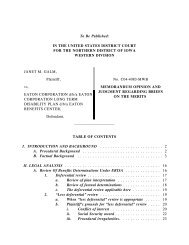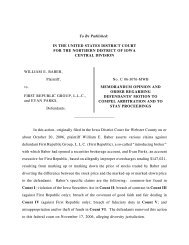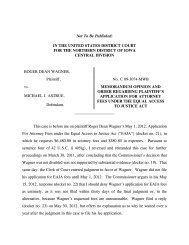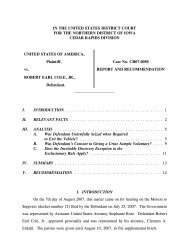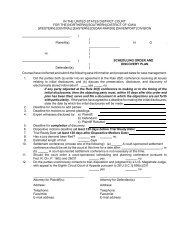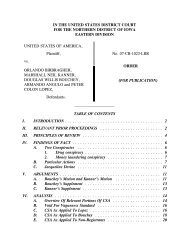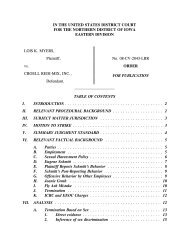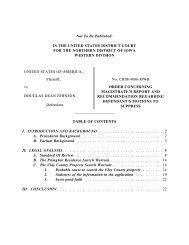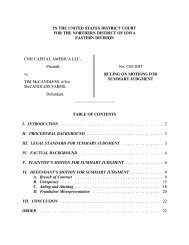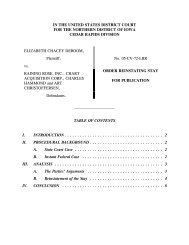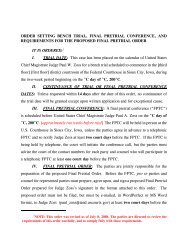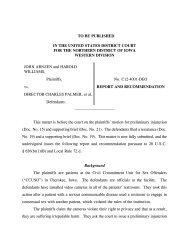Shannon v. Koehler - Northern District of Iowa
Shannon v. Koehler - Northern District of Iowa
Shannon v. Koehler - Northern District of Iowa
You also want an ePaper? Increase the reach of your titles
YUMPU automatically turns print PDFs into web optimized ePapers that Google loves.
10 (...continued)<br />
Dettman v. Kruckenberg, 613 N.W.2d 238, 248 (<strong>Iowa</strong> 2000). The Dettman court also<br />
recited the standard under <strong>Iowa</strong> law to determine if issues <strong>of</strong> fact will be given preclusive<br />
effect:<br />
(1) the issue determined in the prior action is identical to the<br />
present issue; (2) the issue was raised and litigated in the prior<br />
action; (3) the issue was material and relevant to the<br />
disposition in the prior action; and (4) the determination made<br />
<strong>of</strong> the issue in the prior action was necessary and essential to<br />
that resulting judgment.<br />
Id. at 244 (quoting American Family Mut. Ins. Co. v. Allied Mut. Ins. Co., 562 N.W.2d<br />
159, 163-64 (<strong>Iowa</strong> 1997)) (internal quotation marks omitted); accord Plough By and<br />
Through Plough v. West Des Moines Community Sch. Dist., 70 F.3d 512, 516 (8th Cir.<br />
1995) (citing Yancy v. McDevitt, 802 F.2d 1025, 1027-28 (8th Cir. 1986)).<br />
Here, the requirements for issue preclusion are met. First, in both <strong>Shannon</strong>’s<br />
criminal case and in this case, the issue <strong>of</strong> fact to be concluded is identical. In this case,<br />
a relevant consideration in determining the reasonableness <strong>of</strong> <strong>Koehler</strong>’s use <strong>of</strong> force is<br />
whether <strong>Shannon</strong> resisted when <strong>Koehler</strong> attempted to cuff him. In <strong>Shannon</strong>’s criminal<br />
case, Judge McCormick determined, “<strong>Shannon</strong> knowingly resisted Officer <strong>Koehler</strong> in the<br />
<strong>of</strong>ficer’s performance <strong>of</strong> the act <strong>of</strong> handcuffing the Defendant, which was in the scope <strong>of</strong><br />
authority <strong>of</strong> that <strong>of</strong>ficer . . . .” Defendants’ Exhibit 1012. Second, the issue <strong>of</strong> whether<br />
<strong>Shannon</strong> resisted while being cuffed was raised and litigated in <strong>Shannon</strong>’s bench trial.<br />
Third, whether <strong>Shannon</strong> resisted <strong>Koehler</strong>’s attempts to handcuff him was material and<br />
relevant to the disposition <strong>of</strong> the prior action <strong>of</strong> interference with <strong>of</strong>ficial acts. Fourth, and<br />
finally, the determination that <strong>Shannon</strong> resisted was necessary and essential to the<br />
conviction, as it is clear that Judge McCormick based his order on that finding.<br />
Notably, the <strong>Iowa</strong> Supreme Court in Dettman wrote, “We will not show such lack<br />
<strong>of</strong> faith in the criminal judicial system to allow an issue fully and fairly litigated in a<br />
criminal trial to be completely relitigated in a civil trial.” Dettman, 613 N.W.2d at 249<br />
(citation and internal quotation marks omitted). Moreover, the court highlighted that while<br />
<strong>Iowa</strong> law does not permit convictions under the traffic code to be admitted as evidence in<br />
a civil case, see IOWA CODE § 321.489; Dettman, 613 N.W.2d at 245, the legislature has<br />
not created a similar provision for other parts <strong>of</strong> the criminal code: “if the legislature had<br />
intended that convictions under <strong>Iowa</strong> Code chapter 707 be inadmissible to prove an<br />
(continued...)<br />
25



